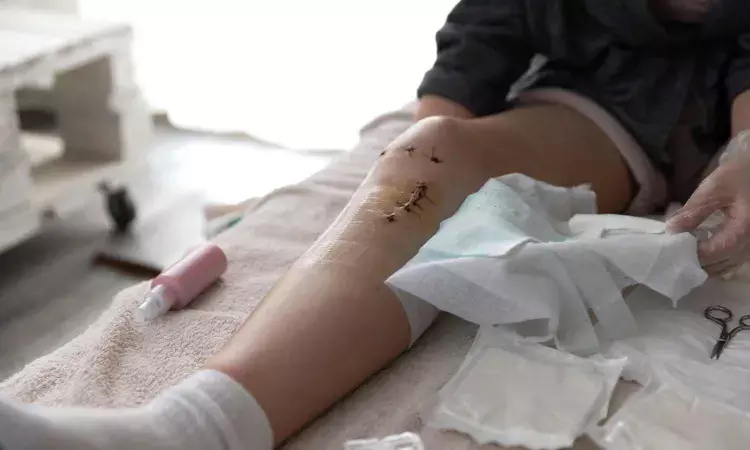- Home
- Medical news & Guidelines
- Anesthesiology
- Cardiology and CTVS
- Critical Care
- Dentistry
- Dermatology
- Diabetes and Endocrinology
- ENT
- Gastroenterology
- Medicine
- Nephrology
- Neurology
- Obstretics-Gynaecology
- Oncology
- Ophthalmology
- Orthopaedics
- Pediatrics-Neonatology
- Psychiatry
- Pulmonology
- Radiology
- Surgery
- Urology
- Laboratory Medicine
- Diet
- Nursing
- Paramedical
- Physiotherapy
- Health news
- Fact Check
- Bone Health Fact Check
- Brain Health Fact Check
- Cancer Related Fact Check
- Child Care Fact Check
- Dental and oral health fact check
- Diabetes and metabolic health fact check
- Diet and Nutrition Fact Check
- Eye and ENT Care Fact Check
- Fitness fact check
- Gut health fact check
- Heart health fact check
- Kidney health fact check
- Medical education fact check
- Men's health fact check
- Respiratory fact check
- Skin and hair care fact check
- Vaccine and Immunization fact check
- Women's health fact check
- AYUSH
- State News
- Andaman and Nicobar Islands
- Andhra Pradesh
- Arunachal Pradesh
- Assam
- Bihar
- Chandigarh
- Chattisgarh
- Dadra and Nagar Haveli
- Daman and Diu
- Delhi
- Goa
- Gujarat
- Haryana
- Himachal Pradesh
- Jammu & Kashmir
- Jharkhand
- Karnataka
- Kerala
- Ladakh
- Lakshadweep
- Madhya Pradesh
- Maharashtra
- Manipur
- Meghalaya
- Mizoram
- Nagaland
- Odisha
- Puducherry
- Punjab
- Rajasthan
- Sikkim
- Tamil Nadu
- Telangana
- Tripura
- Uttar Pradesh
- Uttrakhand
- West Bengal
- Medical Education
- Industry
High Glucose in Non-Diabetic Patients Increase Infection Risk in Leg Fractures

A recent study published in Advances in Orthopedics found a significant association between elevated blood glucose levels and an elevated risk of surgical-site infections (SSIs) in nondiabetic patients with open leg fractures. The research also found the potential impact of prolonged hospital stays in such cases.
This study examined the connection between SSI occurrence in nondiabetic patients with open leg fractures and their blood glucose levels upon arrival in the emergency room. Additionally, the study explored the relationship between hospitalization duration and SSI incidence and the timing of fixation procedures in relation to SSI development.
The research retrospectively focused on nondiabetic patients treated in the emergency department between 2017 and 2021 for open leg fractures. Patients were categorized into two groups: those who developed SSIs (group A) and those who did not (group B) within one year after surgery. All patients underwent damage control procedures within 24 hours of admission to the ER and definitive surgery upon stabilization of their condition.
A total of 80 patients were included in the study. In group A, the average blood glucose level upon ER arrival was 148.35 ± 19.59 mg/dl, compared to 122.61 ± 22.22 mg/dl in group B (p-value: 0.0001). In group A, the average blood glucose on the first postoperative day was 113.81 ± 21.07 mg/dl, while in group B, it was 99.02 ± 17.60 mg/dl (p-value: 0.001).
Moreover, the average hospital stay in group A was notably longer at 57.92 ± 42.43 days, compared to 18.41 ± 14.21 days in group B (p-value: 0.01). By utilizing statistical analysis, the study identified a blood glucose threshold of 132 mg/dl as a potential indicator of heightened SSI risk.
This study highlights the substantial risk of SSIs among nondiabetic patients with elevated blood glucose levels, as well as the extended hospital stays associated with this condition. It suggests that a blood glucose level of 132 mg/dl might be a valuable marker to assess the SSI risk in these patients.
Reference:
Cianni, L., Caredda, M., De Fazio, A., Basilico, M., Greco, T., Cazzato, G., Perisano, C., Maccauro, G., & Vitiello, R. (2023). Stress-Induced Hyperglycemia is a Risk Factor for Surgical-Site Infections in Nondiabetic Patients with Open Leg Fractures. In A. L. Carl (Ed.), Advances in Orthopedics (Vol. 2023, pp. 1–8). Hindawi Limited. https://doi.org/10.1155/2023/6695648
Neuroscience Masters graduate
Jacinthlyn Sylvia, a Neuroscience Master's graduate from Chennai has worked extensively in deciphering the neurobiology of cognition and motor control in aging. She also has spread-out exposure to Neurosurgery from her Bachelor’s. She is currently involved in active Neuro-Oncology research. She is an upcoming neuroscientist with a fiery passion for writing. Her news cover at Medical Dialogues feature recent discoveries and updates from the healthcare and biomedical research fields. She can be reached at editorial@medicaldialogues.in
Dr Kamal Kant Kohli-MBBS, DTCD- a chest specialist with more than 30 years of practice and a flair for writing clinical articles, Dr Kamal Kant Kohli joined Medical Dialogues as a Chief Editor of Medical News. Besides writing articles, as an editor, he proofreads and verifies all the medical content published on Medical Dialogues including those coming from journals, studies,medical conferences,guidelines etc. Email: drkohli@medicaldialogues.in. Contact no. 011-43720751


